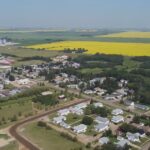The corridors of Yellowknife schools will fall eerily quieter this fall as the city grapples with one of the most significant education workforce reductions in the Northwest Territories’ recent history. Yellowknife Education District No. 1 (YK1) has confirmed the elimination of 79 education assistant positions, a decision that has sent shockwaves through the community and raised serious concerns about the future quality of education for the territory’s most vulnerable students.
“This isn’t just about job losses—it’s about removing critical support systems from children who desperately need them,” said Marilyn Barnes, a parent of a special needs student at École Sir John Franklin High School. “My daughter has thrived because of her education assistant. Now we’re facing an uncertain future.”
The cuts come in the wake of significant budget constraints facing the territory’s education system. According to documents obtained from the YK1 school board, the district is attempting to address a $3.2 million funding shortfall, with education assistants bearing the brunt of these austerity measures. The board cited declining enrollment and reduced territorial funding as primary factors behind the decision.
Education assistants, who provide individualized support to students with diverse learning needs, developmental challenges, and behavioral issues, typically earn between $52,000 and $65,000 annually in the Northwest Territories. The elimination of these positions represents not only a significant financial impact on the affected staff but also raises questions about educational equality across the territory.
Northwest Territories Teachers’ Association President Matthew Miller expressed profound disappointment at the scale of the cuts. “Education assistants are the unsung heroes of our school system. They work with our most vulnerable students, often preventing potential crises before they occur. This loss will be felt in every classroom across Yellowknife.”
The timing of the announcement has added to community frustration, with notifications sent to affected staff just weeks before the end of the current school year. Many education assistants have worked in their positions for over a decade, developing specialized skills and deep relationships with the students they support.
Territorial Education Minister Caroline Cochrane acknowledged the difficult situation in a statement to CO24 News, noting that “difficult decisions are necessary in the current fiscal climate,” but promised to “monitor the situation closely to ensure student needs are being met.”
However, education experts warn that the impacts could be far-reaching. Dr. Jennifer Larson, an education policy analyst at the University of Alberta, points to research suggesting that reducing support staff often leads to increased teacher burnout, higher student absenteeism, and poorer academic outcomes, particularly for students with special needs.
“The evidence is clear—when you remove educational supports, the entire system suffers,” Larson explained. “The savings realized today often translate to significantly higher social and educational costs down the road.”
Parents and community advocates are mobilizing in response to the cuts. A petition calling for the restoration of the positions has gathered over 3,200 signatures in just three days, while a community meeting scheduled for next week is expected to draw hundreds of concerned residents.
The Yellowknife situation reflects broader challenges in Canadian education funding, particularly in northern and remote regions where educational costs per student are significantly higher than in more populated southern communities. The territorial government faces unique challenges in balancing fiscal constraints with the educational needs of geographically dispersed and diverse student populations.
As Yellowknife prepares for the new school year in September, the question remains: in our efforts to balance budgets, are we unwittingly creating an educational deficit that will affect a generation of northern students? And can a society truly progress when its most vulnerable learners are left without the supports they need to succeed?

























